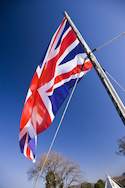The Reign of Britain Begins

Fearful that their route to the riches of India would be compromised by Napoleon’s imperialist impulse, the British took action and, for the second time, sent a fleet to seize the Cape.
They anchored at Table Bay in January 1806, and quickly scattered the Batavian force of mercenaries who were called out to repulse that Brits at the Battle of Blaauwberg. After the battle, the Batavian administrators gallantly conceded defeat, got into their ships and sailed away, waving goodbye to the Cape after just 3 short years.
The British took over the Cape for a second time and, this time round, they went on to make a century, not out. Napoleon met his Waterloo in 1815 at the hands of the Iron Duke, Lord Wellington. He was banished to the British-controlled island of St Helena, where he ended his days drinking bottles of sweet Constantia wine and mourning his lost empire.
The British took formal control of the Cape under the Treaty of Paris, and many of the officers who took part in the mighty Peninsula Campaign against Bonaparte went on to serve governors and administrators of the new British colony at the Cape.
By David Fleminger